|
|
|
Sort Order |
|
|
|
Items / Page
|
|
|
|
|
|
|
| Srl | Item |
| 1 |
ID:
107548
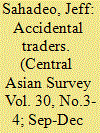

|
|
|
|
|
| Publication |
2011.
|
| Summary/Abstract |
Shrinking opportunities on the Soviet periphery pushed increasing numbers of Caucasus and Central Asian peoples to late twentieth-century Moscow. This article analyses the migration experiences of two Kyrgyz, one Uzbek and one Azeri who left their native villages, eventually engaging in private trade in Moscow's streets and markets. Using oral histories, the article reveals the importance and extent of trading networks across the Union of Soviet Socialist Republics, and the opportunities as well as perils that faced those who participated in this grey-market activity. Traders confronted complicated dynamics of inclusion and exclusion, and sometimes racism, from the host society. The migrant experience transformed ideas of identity and ethnicity, at home and away. As each realized economic goals, these traders also considered pursuit of social mobility, attracted by Moscow's dynamism. Strong family relationships and a tenuous sense of incorporation in the Soviet capital drove them home in the late 1980s.
|
|
|
|
|
|
|
|
|
|
|
|
|
|
|
|
| 2 |
ID:
107545


|
|
|
|
|
| Publication |
2011.
|
| Summary/Abstract |
In this paper the authors explore alternative discursive constructions by Kazakhs in Mongolia and Kazakhstan of a 'Kazakh homeland', one which is markedly not coterminous with the borders of any state. As the use of nomadic pasture lands cut through and across state borders in the last centuries, so do contemporary Kazakhs describe and justify a variety of other cultural practices, from visiting shrines to obtaining illegal passports, in terms of a shared 'Kazakh' cultural history of movement. The stories people evoke and tell about the connection and 'Kazakhness' (Kazakhshylykh) evidence the simultaneous idealization of both ancestral rootedness and mobility as fundamental to a sense of 'belonging' to the land. This ancestral world also reveals the fundamentally arbitrary nature of borders in a world where belonging is made by moving: moving through space, moving through time. From such discursive temporal and spatial practices of passing and dwelling emerges a cultural-historical position that ultimately transcends the region's colonial history and its current nationalizing states.
|
|
|
|
|
|
|
|
|
|
|
|
|
|
|
|
| 3 |
ID:
107536


|
|
|
| 4 |
ID:
107537


|
|
|
|
|
| Publication |
2011.
|
| Summary/Abstract |
This paper addresses early Soviet efforts to secure 'under lock and key' its over-5000-km-long Central Asian border with Iran, Afghanistan and Xinjiang. The state sought to build relations of trust and friendship between border dwellers and guards - the pogranichnye voiska - to increase security and to demonstrate the emancipatory nature of the Soviet Union. However, these goals were compromised by the region's geographic extremity, basmachi raids and existing flows of people, goods and flocks across the state border. As a result, the early state pursued a contradictory set of policies in order to discourage indiscriminate crossings and to project an image of friendship - however limited in practice - across the border. Secret police circulars and reports from the Communist Party's Central Asian bureau testify to the difficulty and contradictions of crafting friendship on the border in the Soviet Union's first two decades.
|
|
|
|
|
|
|
|
|
|
|
|
|
|
|
|
| 5 |
ID:
107538
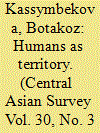

|
|
|
|
|
| Publication |
2011.
|
| Summary/Abstract |
This article re-evaluates the history of internal resettlement in Soviet Tajikistan in the 1920s and early 1930s. Rather than a purely 'economic' measure, as the policy has thus far been identified by historians, the programme of internal resettlement had political and military rationales to secure the republic's southern plains bordering Afghanistan. These territories were considered by Soviet leaders to be insecure and under threat. By pointing to the role of ethnic categories in organizing the resettlement and the violent manner in which the policy was conducted, the author analyses state leaders' attempts to ethnicize territories and populations in order to identify, naturalize and secure allies, within and beyond Tajikistan. Tajikistan's resettlement had internal as well as foreign-policy objectives to secure the Soviet Union's border regions as well as to spread Soviet influence abroad.
|
|
|
|
|
|
|
|
|
|
|
|
|
|
|
|
| 6 |
ID:
107540
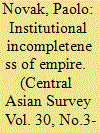

|
|
|
|
|
| Publication |
2011.
|
| Summary/Abstract |
Afghanistan's territory and populations have long been crucial nodes for the assertion of regional and global projects of domination. In order to gain analytical insight into the identity and dispositions of such projects, the paper studies one significant episode of intervention over Afghan populations: the three-decade long protection and assistance practices in support of Afghan refugees in Pakistan. The paper has three objectives. First, it highlights the enabling aspects of Afghan refugee movement, that is, as constitutive and generative of complex politico-institutional orders and of social hierarchies, at a variety of scales. Second, it locates the analytical understanding of such orders and hierarchies within academic narratives that postulate a relation between refugee interventions and imperial politico-institutional orders. Third, it challenges some of the analytical tenets of such narratives by foregrounding the incompleteness and overlap of such institutional orders. On these bases, the article offers a nuanced and contextualized understanding of 'imperial order' as a form of rule that is premised on the continuous attempt to establish hierarchies out of a context of institutional disorder.
|
|
|
|
|
|
|
|
|
|
|
|
|
|
|
|
| 7 |
ID:
107539
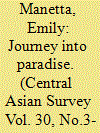

|
|
|
|
|
| Publication |
2011.
|
| Summary/Abstract |
In 2003, a Tajik film crew was permitted to cross the tightly controlled border into Afghan Badakhshan in order to film scenes for a documentary entitled Sacred Traditions in Sacred Places. Although official Tajik state policies and international non-governmental organizations have increasingly stressed freer movement and greater connectivity between the two sides, this 'prescribed community' strongly contrasts with the lived experience of Tajik Badakhshanis. This article explores narratives of nostalgia and dissonance reflected in the film itself and recounted by the film crew in interviews during film production and screening. Engaging with existing work on the interpretation and temporalization of space and post-Soviet nostalgias, I claim that this particular nostalgia emerges in response to new configurations of power and newly imposed pressures valuing cross-border movement. In this case, nostalgia serves as an affective resource helping Tajik Badakhshanis understand and manage daily life and the new potential for border crossing in a highly regulated border zone.
|
|
|
|
|
|
|
|
|
|
|
|
|
|
|
|
| 8 |
ID:
107549
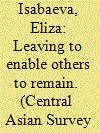

|
|
|
|
|
| Publication |
2011.
|
| Summary/Abstract |
This article seeks to extend the scope of existing literature on migration in Kyrgyzstan by revealing the material and moral assessment of labour migration and remittances amongst the people of Sopu Korgon, a village in Southern Kyrgyzstan. Remittances perform important social roles in sustaining social relations, making absent migrants 'present', gaining and/or retaining social status, passing through rites of passage and fostering the emergence of a new wealthy elite. Drawing on ethnographic research, the author examines the ambivalent opinions that surround the issue of migration and explores the idioms through which family absence is justified. The author argues that in addition to the important social functions of remittances, migrants' transfers in Sopu Korgon also help immediate family members to remain in the village and sustain their lives there. This in turn suggests that migrants' money 'slows up time' for other family members, delaying their own need to migrate.
|
|
|
|
|
|
|
|
|
|
|
|
|
|
|
|
| 9 |
ID:
107546
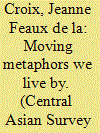

|
|
|
|
|
| Publication |
2011.
|
| Summary/Abstract |
Based on anthropological fieldwork between 2006 and 2008, this article compares how people in the Toktogul region of Kyrgyzstan understand and interact with water in three highly significant places: mountain pastures (jailoos), the Toktogul hydroelectric dam that controls the flow of the Naryn and sacred sites (mazars). Sidelining the vast standing waters of Toktogul Reservoir, valley residents instead highlight the positive qualities of flowing water at mazars, pastures and the working dam. Contrasting how metaphors of running water are put to use conceptually by Toktogul residents and social scientists opens up a critique of current academic and policy-oriented descriptions of the world as 'flow'. Attention to a particular kind of movement (flowing water) highlights some of the silent assumptions in current depictions of a mobile world 'in flux'.
|
|
|
|
|
|
|
|
|
|
|
|
|
|
|
|
| 10 |
ID:
107547


|
|
|
|
|
| Publication |
2011.
|
| Summary/Abstract |
This article explores the relationship between continuity and change in Central Asian domestic felt textile production. In order to set this in the context of a pastoralist perspective, the paper draws on regional practices such as oral poetry and movement through landscape, as well as human-environment relations in order to reveal the dynamic and creative improvisatory process through which local textile production can be understood. In so doing, it examines whether Euro-American anthropology's rejection of a 'static' notion of 'tradition' for one of hybridity (reflecting a critique of its own nostalgia), has inadvertently moved us away from a focus on the historical narratives of those we study, which is often at odds with their own concerns. The author argues that for 'moving people', it is the dynamics of orality, human-environment relations and the practice (rather than the evidence) of material culture that elucidates our understanding of the relationship between continuity and change. The power of felt is thus reflected in the apparently ephemeral, non-enduring, aspects of these practices, which are what makes them endure, continuously bringing the past into being for new cultural futures.
|
|
|
|
|
|
|
|
|
|
|
|
|
|
|
|
| 11 |
ID:
107542


|
|
|
|
|
| Publication |
2011.
|
| Summary/Abstract |
The Shcherbina Expedition of 1896-1903 was the Russian Empire's most concerted effort to gather the data necessary to facilitate peasant settlers' migration to its largely nomadic steppe oblasts. Although this expedition was a massive exercise of imperial power privileging sedentary over mobile pastoralist lifeways, the oppositional views of its participants made matters more ambiguous. The civilizational hierarchies that emerged in its materials did not strictly privilege sedentary lifeways, and an effort was made to preserve mobile pastoralists' lifeways and economic wellbeing. The project of objectively correct colonization that the expedition embodied was initially embraced by all interested parties as a certain solution to the clash of lifeways brought about by peasant migration to the steppe. After its work was published, however, contested use of its statistical norms made it clear that the idea of 'correct colonization' could not prevent the serious conflicts engendered by settlement in the steppe.
|
|
|
|
|
|
|
|
|
|
|
|
|
|
|
|
| 12 |
ID:
107544
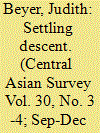

|
|
|
|
|
| Publication |
2011.
|
| Summary/Abstract |
This article explores how the inhabitants of two villages in northern Kyrgyzstan relate to one another and to their environment in terms of both place and genealogy. By performing relatedness, people make claims upon a physical landscape, while their relationships are simultaneously shaped by perceptions of the particular place they live in. The term 'settling descent' evokes this dialectic, in which people 'settle' descent in a literal sense in rituals, statues, objects and the stories they tell about the past and the present. The often-repeated academic opposition of 'identity through kinship' vs. 'identity through locality' is resolved by showing how both are aspects of the same historical process. The paper draws on oral histories of key informants, ethnographic case studies and classical as well as recent literature on kinship, place, post-socialism and the anthropology of Central Asia.
|
|
|
|
|
|
|
|
|
|
|
|
|
|
|
|
| 13 |
ID:
107550


|
|
|
|
|
| Publication |
2011.
|
| Summary/Abstract |
Most research on labour migration from Central Asia has explored the motivations and strategies of those who move. Comparatively less attention has been given to the experience of family members who stay behind. This paper draws on ethnographic research amongst the wives of migrant husbands in a site of gendered out-migration in eastern Uzbekistan to explore diverse experiences of 'staying put'. Whilst spousal absence is experienced by some women as expanding the possibilities for social and spatial mobility, for others it can exacerbate the degree of control exerted by in-laws. Through this ethnography the author argues for a relational politics of mobility: that is, attention to the ways in which the movement of some can constrain (or compel) the mobility of others. Gendered out-migration is both embedded in, and transforms, the domestic organization of honour (nomus), in ways that are socially consequential. In Central Asia, the author argues, a richer understanding of labour migration can be gained by bringing different scales of movement into the same analytical frame and by attending ethnographically to the habitual production of place.
|
|
|
|
|
|
|
|
|
|
|
|
|
|
|
|
| 14 |
ID:
107541


|
|
|
|
|
| Publication |
2011.
|
| Summary/Abstract |
Between 1827 and 1846 Russia exiled as vagrants (brodiagi) to Siberia 48,566 persons, who accounted for 30.4% - the single largest cohort - of exiles during that period. Exiled brodiagi's numbers fell briefly after 1846, due to government efforts to use them in labour battalions, but reached unprecedented levels following serf emancipation. This, like other anti-vagrancy campaigns, was symptomatic of states' increasing domination over society and highlights a modernizing process that prohibits nomadism while promoting sedentariness. Yet, although brodiagi were produced by the state's exercise of power, they managed to display agency by resisting this power. The resultant struggle led to Siberia being turned into contested ground. Embodied within this struggle was the larger struggle between tsarist state and society: operating at the edges of society, in a region far removed, or 'deranged', from the centre, Siberia's brodiagi manifested, both territorially and behaviourally, the 'extremities' that Foucault has spoken of with regard to power, how it functions and how it is resisted.
|
|
|
|
|
|
|
|
|
|
|
|
|
|
|
|
| 15 |
ID:
107543


|
|
|
|
|
| Publication |
2011.
|
| Summary/Abstract |
During the Russian Civil War, special vehicles visited the vast country's diverse regions as emissaries of central authority. The so-called 'agitational' vehicles carried out the functions of propaganda and agitation, 'instruction' (governance) and surveillance in the pursuit of two overarching, and sometimes contradictory, goals: state building and the radical transformation of society. The Krasnyi Vostok (Red East) expedition to Turkestan in 1920 was exceptional in the degree to which the train interfered in local governance regimes. It sought to win over a Muslim majority that had been terrorized by Soviets formed by Russian colonizers, which had not represented the masses but rather perpetuated racist domination. Ironically, having surveyed the vast gulf between the Bolsheviks' revolutionary gaze and the complex and diverse world in which they found themselves, the Krasnyi Vostok activists concluded that 'socialist colonization' was the essential task in Turkestan.
|
|
|
|
|
|
|
|
|
|
|
|
|
|
|
|
|
|
|
|
|